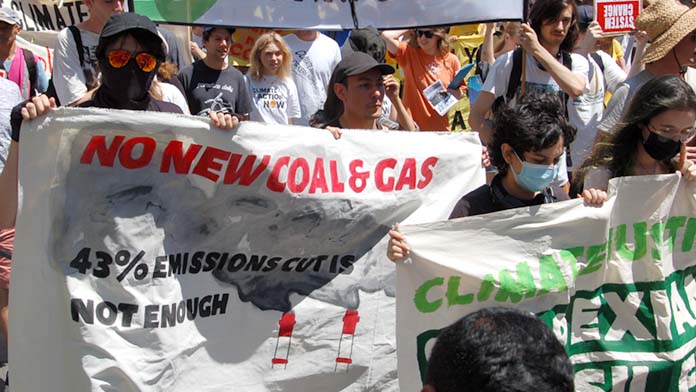The Albanese government wants to force changes to the climate Safeguard Mechanism through parliament by 31 March. The policy is central to Labor’s claim it is taking climate change seriously and working to cut emissions.
Its purported aim is to reduce the emissions of Australia’s biggest industrial polluters. But companies will be allowed to buy their way out of reducing emissions through purchasing offsets if they exceed their emissions limit.
There is mounting opposition to this, with climate scientist Bill Hare calling it state-sanctioned greenwashing. It will do nothing to stop the over 100 new fossil fuel projects in the approval pipeline and will likely lead to an increase in emissions.
Labor’s emissions reduction target of 43 per cent by 2030 is already weak, far below the 75 per cent target consistent with the Intergovernmental Panel on Climate Change’s reports. But the new measures make its climate failure far worse.
The Safeguard Mechanism was introduced by the Coalition. In its six year existence it has failed to reduce emissions.
The current scheme covers 215 of Australia’s biggest industrial polluters – those that emit more than 100,000 tonnes of carbon every year, including mining and manufacturing. They represent 28 per cent of the country’s annual emissions.
All of these facilities were required to limit their emissions to a Safeguard baseline. Instead, overall emissions increased by 7 per cent.
Despite this, Labor has chosen to “revamp” it rather than scrap it, planning more stringent baselines, a $275 penalty for every tonne of carbon beyond the limit, and a 4.9 per cent baseline decrease every year.
But the reforms leave in place a massive loophole. Companies can purchase unlimited carbon credits to offset their emissions–allowing them to continue polluting.
Carbon credits
These Australian Carbon Credit Units (ACCUs) are typically generated by specialised companies who manage projects like reforestation, with trees consuming carbon dioxide from the atmosphere.
Companies such as energy giant Santos plan to offset emissions by investing in carbon capture and storage projects directly.
But offsets are not equivalent to the fossil fuel emissions they replace.
Trees in reforestation projects can burn down or die after a few decades. Carbon from burning fossil fuels will stay in the atmosphere far longer.
There is also significant evidence that at least 75 per cent of Australian carbon credits do not reduce emissions at all. For example, companies have claimed credits for protecting forests that would never have been cut down anyway.
Not only is the carbon stored hard to measure, companies profiting from these projects have an incentive to exaggerate, double count, or simply lie about offset projects.
Professor Andrew Macintosh, the former chair of the ACCU scheme’s regulatory body, blew the whistle on the Australian carbon credit market, claiming it was largely a sham.
In one study Macintosh and his colleagues found that 17.5 million carbon credits were issued to projects meant to regrow native forests. However, the total forest area had barely increased at all.
Carbon offset credits are being exposed as a scam worldwide.
Four Corners recently uncovered an offsets company in PNG that was logging the forest it was supposedly protecting to create carbon credits for Australian companies.
The Liberals are opposing the changes outright, forcing Labor to negotiate with The Greens and the crossbench.
The Greens have said they will consider supporting them if Labor promises to stop new coal and gas projects. Bandt however has said this is an “offer” not an “ultimatum”.
Labor is again accusing The Greens of threatening to block climate action and siding with the Liberals.
But The Greens are right to insist on no new coal and gas projects.
An Australian Institute report calculated that the emissions associated with the 116 new coal and gas projects on the way would total to 1.7 billion tonnes of carbon dioxide annually.
This is three times Australia’s current annual emissions – completely overshooting our already weak emissions reduction target.
The Scarborough gas project in WA alone could make Labor’s already inadequate 43 per cent target impossible to achieve.
We are now three years into the most critical decade for climate action. The Safeguard Mechanism will do nothing to reduce existing emissions. It will allow huge expansion of digging up and burning coal and gas, and widespread use of dodgy offsets.
The climate strike on 3 March is demanding no new coal and gas, and real carbon cuts not offsets. We should take this opportunity to expose Labor’s greenwashing and build a fight for real emissions reductions, no new coal and gas and a just transition to 100 per cent public renewable energy.
By Jordi Pardoel






